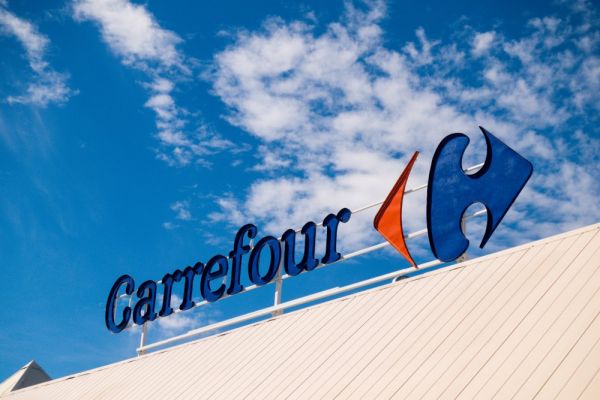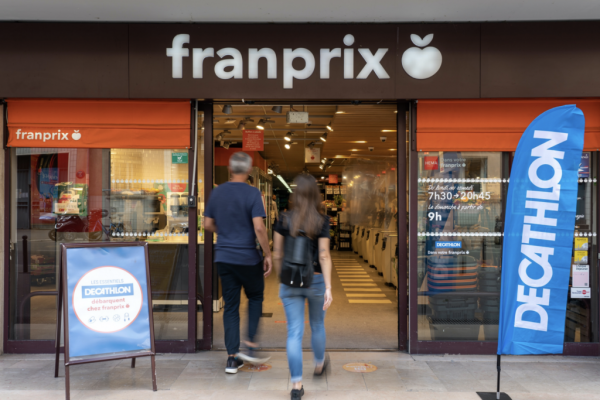It's been a tough year for the grocery industry, with the spectre of recession and unwanted horses in the background. But a host of industry experts at the IGD convention 2013 agreed that innovation and taking the desires of consumers seriously will lead to a bright future. ESM's Ben Webb reports.
It’s almost a double act, with Joanne Denney-Finch (pictured, below left) – the ever- astute and hard-hitting IGD chief executive – playing the crucial straight role. The wit is cannily injected by Michael Buerk, the urbane veteran of these insightful and informative events. He bestrides the stage in a bossy, businesslike, but carefully light-hearted way. He knows his onions – their provenance, price, strength and importance.
Whatever happens in the world outside, there is always a sense of well-being at the IGD convention. The men in grey suits – and it is, regrettably, a very grey-suited affair – take pride in their optimism, get- up-and-go and ability to find solutions rather than dwell on the problems – challenges, they chorus! – that lie ahead.
There is also a dose of realism. As ever, JDF delivered a polished and convincing speech that set the tone. She paced onto the stage in a smart trademark suit and pulled no punches. “We need a revolution,” she began, “a revolution in transparency and traceability. [...] Trust is a precious commodity, but there’s a lot less of it around these days.”
It’s not just the horse-meat scandal that the food industry needs to counter. Health issues are foremost in the consumer’s mind. And then there’s sustainability and the need to reduce waste. The information that Tesco released about the scale of waste in the grocery sector was a shock, even to those who were already aware that there was a problem. A staggering 30,000 tonnes of Tesco’s food was wasted in the first six months of 2013. “Eight in ten shoppers believe food and grocery companies should know where every single ingredient comes from,” Denney-Finch said. “I wonder how many companies can meet that expectation.”
Shoppers, who are armed with more information than ever before, as they prowl the aisles with smartphones scouring the net for the latest info on the products they’ve just scanned, will head for grocers who do provide good information, whom they trust, and who make shopping simple, ethical and enjoyable. “There are still gaps,” Denney-Finch said. “Too many logos. Too much small print.” She added, “Traceability and transparency are not really overheads ... they are investments. Total traceability, especially in real time, will let us see right along a supply chain ... anywhere in the world. This will release working capital, and with less stock, we’ll be able to deliver better availability, even with the challenge of multichannel.”
Long Live The King
The theme of trust was continued during an on-stage interview, when Michael Buerk quizzed Justin King, the dapper Sainsbury’s CEO who manages to sprinkle a little stardust wherever he smiles, about the state of the market. “Justin, I can feel your charisma from here. It’s positively radiating!” Buerk said with a wry smile.
King went on to point out that a stronger dialogue between retailer and shopper was critical. ‘Horsegate’ has changed the landscape for the food industry, which will need to work hard to restore shopper confidence. “We must never be guilty of thinking that horse meat wasn’t something very profound,” King said. Echoing the words of Denney- Finch, he said that the retailer had to stay one step ahead of what the consumer is asking for, and to introduce new levels of transparency over sourcing.
King added that there were now plenty of signs that shopper confidence was moving in the right direction. He pointed out that this is from a very low base, with most shoppers still facing very challenging personal financial circumstances. In net terms, people have less money than a year ago, so there are no grounds to expect a sea change in their approach to spending on groceries. Price remains key, but, ironically, the various price-matching schemes in the UK market have taken the focus away from price. Price is now almost a given. The retailers can now move the debate and the search for competitive advantage into other areas, such as freshness and quality.
Interestingly, King was bullish about the much-maligned hypermarket and other large-format stores, with the 40-80,000- square-foot food-focused stores remaining critical to the industry. Convenience may be rapidly growing, but it is the larger stores that can deliver inspiring food propositions and continue to be the driving force of the sector.
Sainsbury’s has certainly caught a wave of consumer sentiment. Its second-quarter trading (to 28 September) showed sales were up 5 per cent (4.6 per cent excl. fuel) and like-for-like sales were up 2.1 per cent (2 per cent excl. fuel). At the heart of this performance is the role of private label, which is growing at twice the rate of branded goods.
Innovation Is Still The Key
The theme of the convention moved on to innovation. With Sainsbury’s private label soaring ahead of the brands – a trend that’s replicated across Europe – it’s almost time to feel sorry for the big manufacturers. It’s a tough time for them.
P&G’s Irwin Lee, vice-president and managing director of the UK and Ireland, didn’t look too down in the mouth, however. He stood up and got straight to the point, charging that a brand strategy of trying to grow sales by relying on an endless round of promotions was doomed, at best, to marginal gains and, at worst, to failure. “There is nothing proprietary in price promotions,” he said. “We believe promotions win quarters, but true innovation wins decades.”
Later, Stefan Bomhard, Bacardi’s regional president for Europe, came up with a good example of an innovative product and the sort of creative support that establishes its place in the market. In a jaunty and confident talk – Bacardi’s performance gives all its employees a reason to be cheerful – he pointed out that being part of a family business has its advantages. Freed from the need to deliver annual dividends and the like, management can look to the long term.
Bomhard talked about “taking a classic and making it different”, which is what Bacardi did with Bombay Sapphire by promoting the amazing flavours of the botanicals that are an essential ingredient. Gin had been around a long time, but it needed a new and glitzy appeal. As 85 per cent of flavour comes from the nose, Bacardi also launched a special wide glass and pushed it through retail partners.
The advertising emphasised that lots of ice was key – a G&T was a premium drink that had to be made with skill and passion. To boost the heritage of the brand, Bacardi opened a new distillery in, of all places, Hampshire, UK – perhaps exporting south of the border, in the way that Scottish whisky plays off its heritage. “People said we were mad, but it’s there today,” Bomhard said with a broad grin.
Debbie Robinson, Spar UK’s managing director, introduced the concept of the ‘foodpreneur’, the innovative grocery and foodservice operator. It might not roll off the tongue, but it captured the feeling in the room – that new ideas and fresh thinking are a vital part of the new retail landscape. Those years when cutting prices seemed to be the underlying principle felt a little old hat. “The entrepreneurial instinct is in you,” Robinson said, and talked about ‘Sparpreneurs’ driving their global brand. “You can’t learn it, you can’t buy it, you can’t put it in a bottle. For them, it’s not just a job. Part of them is bottled.” Robinson talked about a new idea in the wilds of East London, where a trendy restaurant called Eat 17 (after the area, East 17) is linked to the local Spar. The Spar bakery bakes the bread for the restaurant. It is a partnership being woven together in the community, by local people who want to make the most of where they live. It’s a template she admires.
“Without entrepreneurs, we will never know what we could have had,” Robinson said. “They are people that possess the energy to take an idea and turn it into something tangible.”
It’s Good To Talk
With the room filled with grocers, we were soon back on the subject of relationships and the digital dialogue between store and consumer. Stephen Smith, Asda’s chief marketing officer, said that it was critical to bring “customers into our business” and that it would be just as “important as the layout of stores”.
The store brands, he added, were “held in trust”, and the rise of social media and digital technology enabled those stores to get close to the customer to build trust. “If you believe in loyalty, it’s time to start the social conversation with your customers,” Smith declared.
Steve Murrells, CEO of food retail at the Co-operative Group, was more specific about the consumer who can help boost the grocery sector – the younger generation. “As a grocer, I’m fascinated by the post-recession consumer,” he said, “and what they think about as the recovery begins.”
According to Murrells, this younger, “lost” generation of nine million faces new pressures and challenges, from limited job opportunities to an unclimbable housing ladder, but it is a sector that is “undermarketed”. And there lies the potential. “There is a real reason to be optimistic,” he said. “It is the digital generation, with 95 per cent using Facebook, 43 per cent using Twitter, and 89 per cent watching YouTube.”
In other words, with clever social marketing, an amazing level of trust and loyalty can be created. Armed with smart- phones, values and value for money will be key. They don’t give two hoots for profits and big business. “It is a generation that could teach us a thing or two. It wants to stop, think and shop cooperatively,” Murrells said. “The Co-op chimes with these values. There is a huge opportunity for all in this room, knowing they need us, and that it’s in our interest to commit to them, and if we do, that we will have a successful future.”
The Revolution ... At Last
It’s a fascinating time. There is one major conclusion. The customer, at last, is becoming king. Grocers have talked long and hard about being customer-centric and always serving the customer, but they have always done so on their own terms. Information on packaging, the nature of supply chains, and lots of other vital information have been purposely opaque.
Now the world has changed. Digital information flows have given the consumer the power they have always wanted. Almost half of shoppers (47 per cent) would like to restrict their purchase of food grocery products to fully traceable items, according to IGD figures, up from 42 per cent just three years ago. Three quarters can envisage a time when they will only buy fully traceable products.
Denney-Finch sounded excited as she drew towards the end of her speech. “So this is the way to reinvigorate loyalty ... and differentiate ... around the production regime and the precise place of origin, perhaps even the terroir, as with wine and the vintage. [...] Whenever we’re transparent, it shows we’re confident, as we should be,” she added. “The people with integrity will prevail.” That’s quite a challenge.
© 2013 - European Supermarket Magazine by Ben Webb













